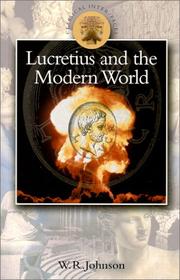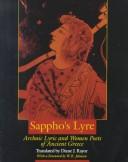| Listing 1 - 3 of 3 |
Sort by
|

ISBN: 0715628828 9780715628829 1336211679 1472502272 1472502280 1472539907 Year: 2006 Publisher: London Bloomsbury Academic, an imprint of Bloomsbury Pub. Plc
Abstract | Keywords | Export | Availability | Bookmark
 Loading...
Loading...Choose an application
- Reference Manager
- EndNote
- RefWorks (Direct export to RefWorks)
"Lucretius' On the Nature of Things - one of the glories of Latin literature - provides a vivid poetic exposition of the doctrines of the Greek atomist, Epicurus. The poem played a crucial role in the reinvention of science in the seventeenth century, its influence on the French Enlightenment was powerful and pervasive, and it became a major battlefield in the wars of religion with science in nineteenth-century England. But in the twentieth century, despite its vital contributions to modern thought and civilisation, it has been largely neglected by common readers and scientists alike. This book offers an extensive description of the poem, with special emphasis on its cheerful version of materialism and on its attempt to devise an ethical system that suits such a universe. It surveys major relevant texts form the eighteenth and nineteenth centuries (Dryden, Diderot, Voltaire, Tennyson, Santayana) and speculates on why Lucretius and the ancient scientific tradition he championed has become marginalised in the twentieth century. It closes with a discussion of what value the poem has for students of science and technology in the new century: what advice it has to offer us about how to go about reinventing our machines and our morality."--Bloomsbury Publishing Lucretius' On the Nature of Things - one of the glories of Latin literature - provides a vivid poetic exposition of the doctrines of the Greek atomist, Epicurus. The poem played a crucial role in the reinvention of science in the seventeenth century, its influence on the French Enlightenment was powerful and pervasive, and it became a major battlefield in the wars of religion with science in nineteenth-century England. But in the twentieth century, despite its vital contributions to modern thought and civilisation, it has been largely neglected by common readers and scientists alike. This book offers an extensive description of the poem, with special emphasis on its cheerful version of materialism and on its attempt to devise an ethical system that suits such a universe. It surveys major relevant texts form the eighteenth and nineteenth centuries (Dryden, Diderot, Voltaire, Tennyson, Santayana) and speculates on why Lucretius and the ancient scientific tradition he championed has become marginalised in the twentieth century. It closes with a discussion of what value the poem has for students of science and technology in the new century: what advice it has to offer us about how to go about reinventing our machines and our morality
Atomism. --- Influence (Literary, artistic, etc.) --- Lucretius Carus, Titus.
Book
ISBN: 022625237X 9780226252377 9780226252230 022625223X 1336190175 Year: 2015 Publisher: Chicago London
Abstract | Keywords | Export | Availability | Bookmark
 Loading...
Loading...Choose an application
- Reference Manager
- EndNote
- RefWorks (Direct export to RefWorks)
One of the best books ever written on one of humanity's greatest epics, W. R. Johnson's classic study of Vergil's Aeneid challenges centuries of received wisdom. Johnson rejects the political and historical reading of the epic as a record of the glorious prehistory of Rome and instead foregrounds Vergil's enigmatic style and questioning of the heroic myths. With an approach to the text that is both grounded in scholarship and intensely personal, and in a style both rhetorically elegant and passionate, Johnson offers readings of specific passages that are nuanced and suggestive as he focuses on the "somber and nourishing fictions" in Vergil's poem. A timeless work of scholarship, Darkness Visible will enthrall classicists as well as students and scholars of the history of criticism-specifically the way in which politics influence modern readings of the classics-and of poetry and literature.
Epic poetry, Latin --- History and criticism. --- Virgil. --- Aeneas --- Αἰνείας --- Aineias --- Enéas --- Эней --- Ėneĭ --- Еней --- Eneja --- Enees --- Eneo --- Énée --- Aeinéas --- Enea --- Enejs --- Enėjas --- Aineiasz --- アイネイアース --- Aineiāsu --- Eneasz --- Ajnejas --- Eneias --- Енеја --- Aeneis --- 埃涅阿斯 --- Ainieasi --- In literature. --- Rome --- aeneid, vergil, virgil, rome, mythology, history, literature, prehistory, heroism, aeneas, aeneis, epic poetry, allegory, apollonius, homer, classicism, language, prosody, narrative, distancing, interiority, tragedy, empire, literary criticism, nonfiction, nachleben, fall, decline, dissolution, politics, hero, sacrifice, war, destruction, violence, gods, classics, ancient world, greece.

ISBN: 1282355864 9786612355868 0520910966 0585139822 9780520910966 9780585139821 0520073355 0520073363 9781282355866 Year: 1991 Publisher: Berkeley University of California press
Abstract | Keywords | Export | Availability | Bookmark
 Loading...
Loading...Choose an application
- Reference Manager
- EndNote
- RefWorks (Direct export to RefWorks)
Sappho sang her poetry to the accompaniment of the lyre on the Greek island of Lesbos over 2500 years ago. Throughout the Greek world, her contemporaries composed lyric poetry full of passion, and in the centuries that followed the golden age of archaic lyric, new forms of poetry emerged. In this unique anthology, today's reader can enjoy the works of seventeen poets, including a selection of archaic lyric and the complete surviving works of the ancient Greek women poets-the latter appearing together in one volume for the first time.Sappho's Lyre is a combination of diligent research and poetic artistry. The translations are based on the most recent discoveries of papyri (including "new" Archilochos and Stesichoros) and the latest editions and scholarship. The introduction and notes provide historical and literary contexts that make this ancient poetry more accessible to modern readers.Although this book is primarily aimed at the reader who does not know Greek, it would be a splendid supplement to a Greek language course. It will also have wide appeal for readers of' ancient literature, women's studies, mythology, and lovers of poetry.
Greek poetry --- Women and literature --- Greek literature --- Women authors --- Sappho --- Sapfo --- Sapfo van Lesbos --- Sappho van Lesbos --- Sapho --- Safo --- Sapʻo --- Saffo --- Sapphus --- Сафо --- سيفو --- Safona --- Σαπφῶ --- Ψάπφω --- Psappho --- academic. --- ancient greece. --- ancient literature. --- anthology. --- archaic lyric. --- famous poet. --- female authors. --- female poet. --- female poets. --- female writers. --- feminism. --- feminist literature. --- feminist. --- gender norms. --- gender studies. --- greek isles. --- heterosexuality. --- historical context. --- homosexuality. --- lesbian poet. --- lesbos. --- literature. --- lyric poetry. --- mythology. --- poetic forms. --- poetry anthology. --- poetry. --- sappho. --- scholarly. --- sexuality. --- translations. --- womens studies.
| Listing 1 - 3 of 3 |
Sort by
|

 Search
Search Feedback
Feedback About UniCat
About UniCat  Help
Help News
News